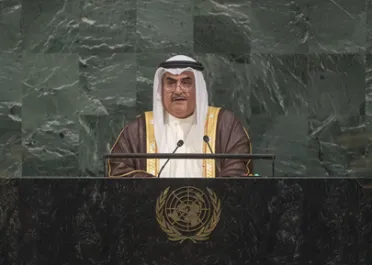Statement
Statement summary
SHAIKH KHALID BIN AHMED BIN MOHAMED AL KHALIFA, Minister for Foreign Affairs of Bahrain, said that his country firmly believed that the maintenance of stability and securing the Middle East required a strong and common political will, as well as serious collective efforts to guarantee respect for the basic principles underlying relations among States. Terrorism was no longer confined to terrorist organizations that could be confronted and eliminated. Rather, that menace had become a tool in the hands of States determined to create crises in other countries in pursuit of their own agenda. It was no longer acceptable to allow rogue countries to occupy others’ territories, violate the sovereignty of States, threaten international peace and security, support terrorism and spread hate and anarchy.
It was also no longer possible to allow those countries to become parties to efforts to bring an end to struggles, resolve conflicts and put an end to complex humanitarian tragedies when they were behind the aggravation of those situations, he continued. Against that backdrop, his country, together with other countries in the region, availed themselves of their sovereign right under international law to sever relations with Qatar. If Qatar wanted to engage in a dialogue and reclaim its place, it must respond positively and with transparency and commit itself to the just demands of Bahrain and others. Regimes that constantly sought to disseminate anarchy and evil were instruments of destruction and would be the biggest losers as they drifted away from the values of collective cooperation among nations.
That was the case in Iran, where the people suffered from oppression, misery and poverty, he said. Establishing normal ties with Iran would require that country to drop its hegemonic, sectarian and ideological policies. Iran must respect the national values of people and refrain from exporting its revolution based on a theocratic system or Government. On Yemen, he reiterated his country’s firm support for the legitimate Government of that country, while on Syria, he urged the international community to exert greater efforts towards protecting civilians and saving lives. Turning to Libya, he applauded the liberation of several major cities from the hands of terrorist groups and affirmed full support for the implementation of the political agreement signed in Skhirat. Further, he reiterated his country’s continued support for the Palestinian people and their legitimate aspirations to enjoy their rights, including an independent State.

